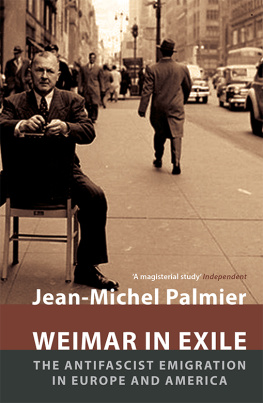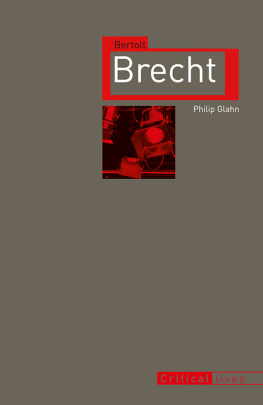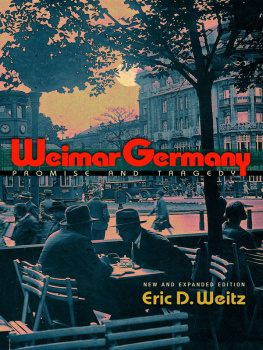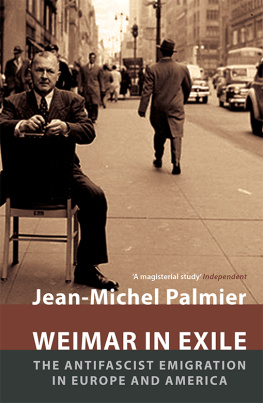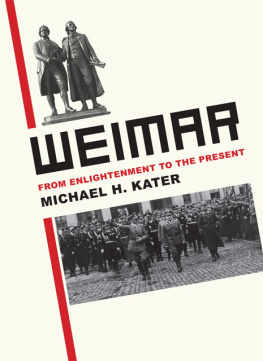Weimar in Exile
The Antifascist Emigration in Europe and America
_________________
JEAN-MICHEL PALMIER
Translated by David Fernbach

This work was published with the help of the French
Ministry of Culture Centre National du Livre
This work is supported by the French Ministry for Foreign Affairs,
as part of the Burgess programme headed for the French Embassy
in London by the Institut Franais du Royaume-Uni

This paperback edition first published by Verso 2017
English-language edition first published by Verso 2006
Translation David Fernbach 2006, 2017
First published as Weimar en exil
Editions Payot 1987
All rights reserved
The moral rights of the author and translator have been asserted
1 3 5 7 9 10 8 6 4 2
Verso
UK: 6 Meard Street, London W1F 0EG
US: 20 Jay Street, Suite 1010, Brooklyn, NY 11201
versobooks.com
Verso is the imprint of New Left Books
ISBN-13: 978-1-78478-644-1
ISBN-13: 978-1-78478-645-8 (UK EBK)
ISBN-13: 978-1-78478-646-5 (US EBK)
British Library Cataloguing in Publication Data
A catalogue record for this book is available from the British Library
Library of Congress Cataloging-in-Publication Data
A catalog record for this book is available from the Library of Congress
Typeset in Times by Hewer Text UK Ltd, Edinburgh
Printed in the US by Maple Press
To the memory of
Carl von Ossietzky, Erich Mhsam, Emil A. Reinhardt, Theodor Lessing, Albrecht Haushofer, Georg Hermann, Erich Knauf, Adam Kuckhoff, Fritz Reck-Malleczwesen, who died in concentration camp or were murdered by the Nazis;
Kurt Tucholsky, Walter Benjamin, Ernst Toller, Walter Hasenclever, Carl Einstein, Ernst Weiss, Stefan Zweig, Balder Olden, Alfred Wolfenstein, who took their own lives in exile;
and to all the German antifascists who never saw Germany again.
But no complaints in our mouths;
Winter will not last for ever.
One day, we shall shout with joy:
Oh, my home, I see you again.
Then the soldiers of Brgermoor
Will no longer march
With spade on shoulder
Through the bog.
The Peat-Bog Soldiers
written in the Bgermoor concentration camp
The key question, in fact, is this: how can we become beasts, beasts in such a sense that the fascists will fear for their domination? A beast is something strong, terrible, devastating; the word emits a barbarous sound. But who believes you can fight barbarism by playing at angels? That would mean trying to parry a sabre blow with the naked fist. We have to understand that goodness must also be able to injure to injure savagery. [] Understand me, I am not saying that we have to go and kill Hitler. That would be bestial, but not intelligent. But we must use murderous weapons, or else the plague will continue until the end of time, at least the end of our time. How can we writers achieve a writing that kills?
Bertolt Brecht, The Intellectual Beast Is Dangerous
There are times in which, for a writer who wants to have some influence, it is not good to write. Times in which the tapping of the typewriter is not as useful as that of the machine-gun. But the latter simply obeys the former.
Kurt Tucholsky, Learning to Laugh Without Crying
There is no document of culture that is not also a document of barbarism.
Walter Benjamin, Poetry and Revolution
Contents
PART ONE: Exile in Europe 193340:
From Reichstag Fire to Spanish War
PART TWO: Exile in America 193945:
From the Second World War to McCarthyism
I always found the name false which they gave us: Emigrants.
That means those who leave their country. But we
Did not leave, of our own free will
Choosing another land. Nor did we enter
Into a land, to stay there, if possible for ever.
Merely, we fled. We are driven out, banned.
Not a home, but an exile, shall the land be that took us in.
Bertolt Brecht, Concerning the Label Emigrant
I
Already in 1933, the number of intellectuals, writers and poets who fled the Nazi dictatorship rose into the thousands. The Reichstag fire, and the ensuing wave of terror, arrests and acts of barbarism, gave the exodus signal for Germanys progressive intelligentsia. They found themselves abruptly thrown onto the paths of exile, while their books were burned outside the universities in medieval ceremonies and the SA ransacked their apartments, threw manuscripts and libraries into the street, and lynched their families and friends. Many among them were certainly Communists, Socialists, Jews, sincere republicans, pacifists, or convinced antifascists. But not all left Germany simply to save their own lives. Some deliberately chose exile as the air at home had begun to stink. They refused to become accomplices, if only by their own silence, and could no longer recognize their country in the laws that legalized terror and sadism. As Heinrich Mann asserted, they not only embodied the honour and dignity of Germany, but the better Germany, that of the mind and the heart.
The blood spilled in every German town went together with the bleeding of culture. It was not just the representatives of Weimar culture that the Nazis murdered, but everything profound and revolutionary that the Republic had created. From a people of poets and thinkers (Dichter und Denker), Germany had become, in words of Karl Kraus that were often repeated, a country of judges and executioners (Richter und Henker). The advent of National Socialism, even before signalling a kind of deep-freeze and regression from which German culture would emerge only with great difficulty, gave rise to a haemorrhage that nothing could staunch. Within just a few months, Germany was drained of its writers, poets and actors, its painters, architects, directors and professors. Never before had any country seen a comparable blood-letting of its cultural life. Few intellectuals, indeed, had seriously envisaged leaving Germany until they were forced precipitately to do so. The Nazi terror caught them unprepared. The majority fled illegally, at risk of their life, and often with neither valid passport nor money. Used as they were to repression of various kinds, even under the Weimar Republic, the Nazi dictatorship had surprised them by its violence, rapidity and effectiveness. Even the most pessimistic lacked imagination when it came to considering what this would mean in concrete terms. Those who fled at the start of 1933 were the most far-sighted, and even none of them foresaw that their exile would last more than ten years.
The preferred countries of refuge were France, Austria and Czechoslovakia, where the emigrants could live freely while remaining close to Germany unable to believe in the new regimes durability. In his poem Thoughts on the Duration of Exile, Brecht sadly expressed the illusion that so many of his fellow migrs shared at this time:
Dont knock any nails in the wall
Just throw your coat on the chair.
Why plan for four days?
Tomorrow youll go back home.
It is easy today to reproach the intellectuals of the Weimar era for their errors and illusions. At the time, however, who did not share these? Is it legitimate even to speak of resignation or self-blinding, as certain historians do? No party of the left really believed, in 1933, that it would be possible for the Nazis to remain in power without any constructive programme. The illusions of the intellectuals, even the most political among them, were those of the parties as well. But if the intellectuals shared these mistakes and dogmatisms, they were often more clearheaded. It was among them, very early on and most forcibly, that the idea of a united front against National Socialism emerged. The warnings that they repeated throughout the exile period proved uncannily prophetic. How can we not recognize today that if practically none of the forecasts of the German Communist party in the 1920s were accurate, almost all those of Kurt Tucholsky sadly were so, even those that seemed at the time most extreme and pessimistic.

